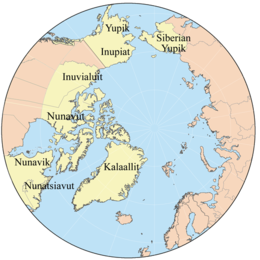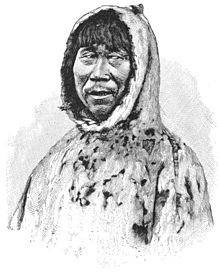爱斯基摩人
此条目可参照英语维基百科相应条目来扩充。 |
此条目需要补充更多来源。 (2020年8月29日) |
| 爱斯基摩人 | |
|---|---|
 因纽特北极圈议会提供的族群分布图 | |
| 总人口 | |
| 183,500 | |
| 分布地区 | |
| 俄罗斯 - 楚科奇自治州 - 萨哈共和国 美国 - 阿拉斯加州 加拿大 - 纽芬兰拉布拉多省 - 西北属地 - 努纳武特地区 - 魁北克省 - 育空地区 格陵兰 | |
| 语言 | |
| 爱斯基摩-阿留申语系诸语、俄语、英语、法语、丹麦语 | |
| 宗教信仰 | |
| 阿拉斯加原住民宗教、因纽特宗教、萨满教、万物有灵信仰 基督教 (俄罗斯东正教、美国东正教、罗马天主教、加拿大圣公会、丹麦教会) | |
| 相关族群 | |
| 阿留申人 |




爱斯基摩人(Eskimos 或 Esquimaux)是北美洲北部(包括美国阿拉斯加北部、加拿大和格陵兰)的因纽特人以及阿拉斯加西部和俄罗斯西伯利亚东北部的尤皮克人的总称,阿留申人与前两种族有一定的亲缘关系。[1]两者使用很相似的语言,均属于爱斯基摩-阿留申语系。

对于爱斯基摩人这个词的词源起源,已经假设了各种理论。[2][3][4][5][6][7]根据史密森尼语言学家艾夫斯·戈达尔的说法,这个词在词源上源于因努-艾蒙语词ayas̆kimew,意思是“系雪鞋的人”,与哈士奇有关。[8][9][10] 在因努语中,assime·w这个词的意思是“她系雪鞋”的意思,因努语使用者以听起来像“爱斯基摩”的词来指代邻近的Miꞌkmaq人。[11][12]
1978年,魁北克人类学家何塞·迈尔霍特(José Mailhot)发表了一篇论文,认为爱斯基摩人的意思是“说不同语言的人”。[13][14]在东部地区遇到因努人(蒙塔格奈人)的法国商人将他们语言的词用于位于更西方的民族,并将其拼写为Esquimau或Esquimaux。[15]
有些人认为爱斯基摩人具有冒犯性,因为它普遍被认为在原居于大西洋沿岸的印地安族群阿尔衮琴部的语言中代表着[14][16][17]“吃生肉的人”。[18]一位不愿透露姓名的克里语使用者认为,变得对爱斯基摩人具侮辱性的原始单词可能是askamiciw(意思是“他生吃它”);因纽特人在一些克里语文本中被称为askipiw(意思是“吃生的东西”)。[19][18][20][21][22][23]无论如何,这个词对许多因纽特人和尤皮克人来说仍然带有贬义。[9][19][24][25]
爱斯基摩人多信万物有灵和萨满教,部分信奉基督教新教和天主教。住房有石屋、木屋和雪屋,房屋一半陷入地下,门道极低。一般养狗,用以拉雪橇。主要从事陆地或海上狩猎,辅以捕鱼和驯鹿。以猎物为主要生活来源:以肉为食,毛皮做衣物,油脂用于照明和烹饪,骨牙作工具和武器。学者为其语言先后创制了用拉丁字母、基里尔字母和加拿大原住民音节文字书写的文字。
因纽特人的祖先原居于西伯利亚,由于当时介乎于美洲和亚洲之间的白令海峡海床甚浅,使他们可以从海堤上横渡,发现北美洲,发展成为了美洲原住民之一。
如今所有族群加起来共有超过183000人,[26][27][28][29]其中有135000人生活在传统的北极圈领地。[8][30]
参考资料
[编辑]- ^ 参见英文维基百科爱斯基摩人条目的“Yupik”章节标题下的“Alutiiq”子标题第一行(They are not to be confused with the Aleut)和该条目第一段内容第三行(Two main groups have historically been referred to as Eskimos by outsiders: the Yupik and Inuit, especially the Iñupiat of Alaska. A third group, the Aleut, is related.)。
- ^ Donna Patrick. Language, Politics, and Social Interaction in an Inuit Community. Walter de Gruyter. 10 June 2013: 2– [2022-04-10]. ISBN 978-3-11-089770-8. OCLC 1091560161. (原始内容存档于2022-05-16).
- ^ Archie Hobson (编). The Oxford Dictionary of Difficult Words. Oxford University Press. 2004: 160– [2022-04-10]. ISBN 978-0-19-517328-4. OCLC 250009148. (原始内容存档于2022-05-16).
- ^ Constance Backhouse; Osgoode Society for Canadian Legal History. Colour-coded: A Legal History of Racism in Canada, 1900-1950. University of Toronto Press. 1 January 1999: 27– [2022-04-10]. ISBN 978-0-8020-8286-2. OCLC 247186607. (原始内容存档于2022-05-16).
- ^ John Steckley. White Lies about the Inuit. University of Toronto Press. 1 January 2008: 21– [2022-04-10]. ISBN 978-1-55111-875-8. OCLC 1077854782. (原始内容存档于2022-05-16).
- ^ McElroy, A. Nunavut Generations: Change and Continuity in Canadian Inuit Communities. Waveland Press. 2007: 8 [2021-11-05]. ISBN 978-1-4786-0961-2. (原始内容存档于2022-05-16).
- ^ Louis-Jacques Dorais. Language of the Inuit: Syntax, Semantics, and Society in the Arctic. McGill-Queen's Press - MQUP. 2010: 297– [2022-04-10]. ISBN 978-0-7735-3646-3. OCLC 1048661404. (原始内容存档于2022-05-16).
- ^ 8.0 8.1 Eskimo | Definition, History, Culture, & Facts. Encyclopedia Britannica. [2021-09-12]. (原始内容存档于2021-12-29).
- ^ 9.0 9.1 Kaplan, Lawrence. Inuit or Eskimo: Which name to use?. www.uaf.edu. Alaska Native Language Center, University of Alaska Fairbanks. [2021-04-02]. (原始内容存档于2022-05-31).
- ^ R. H. Ives Goddard, "Synonymy". In David Damas (ed.) Handbook of North American Indians: Volume 5 Arctic (Washington, DC: Smithsonian Institution, 1985, 978-0874741858), pages 5–7.
- ^ Goddard, Ives (1984). "Synonymy", In Arctic, ed. David Damas. Handbook of North American Indians, vol. 5, ed. William C. Sturtevant, pp. 5–7. Washington, DC: Smithsonian Institution. Cited in Campbell 1997
- ^ Campbell, Lyle (1997). American Indian Languages: The Historical Linguistics of Native America, pg. 394. New York: Oxford University Press
- ^ Mailhot, J. (1978). "L'étymologie de «Esquimau» revue et corrigée", Études Inuit/Inuit Studies 2-2:59–70.
- ^ 14.0 14.1 Cree Mailing List Digest November 1997. [2012-06-13]. (原始内容存档于2012-06-20).
- ^ Eskimo, Inuit, and Inupiaq: Do these terms mean the same thing?. [2022-04-10]. (原始内容存档于2022-05-16).
- ^ Mailhot, Jose. L'etymologie de "esquimau" revue et corrigée. Études/Inuit/Studies. 1978, 2 (2).
- ^ Goddard, Ives. Handbook of North American Indians, Vol. 5 (Arctic). Smithsonian Institution. 1984. ISBN 978-0-16-004580-6.
- ^ 18.0 18.1 Eskimo. American Heritage Dictionary of the English Language: Fourth Edition, 2000. Bartleby. [2008-01-13]. (原始内容存档于2001-04-12).
- ^ 19.0 19.1 Setting the Record Straight About Native Languages: What Does "Eskimo" Mean In Cree?. Native-languages.org. [2012-06-13]. (原始内容存档于2012-06-09).
- ^ Pamela R. Stern. Historical Dictionary of the Inuit. 2004-07-27 [2012-06-13]. ISBN 9780810865563. (原始内容存档于2022-05-16).
- ^ Robert Peroni and Birgit Veith. Ostgroenland-Hilfe Project. Ostgroenland-hilfe.de. [2012-06-13]. (原始内容存档于2012-03-18).
- ^ Words First An Evolving Terminology Relating to Aboriginal Peoples in Canada Communications Branch Indian and Northern Affairs Canada October 2002 (PDF). June 8, 2020 [2022-04-10]. (原始内容 (PDF)存档于2021-03-06).
The term "Eskimo,"applied to Inuit by European explorers, is no longer used in Canada.
- ^ Eskimo | Definition of Eskimo by Oxford Dictionary on Lexico.com also meaning of Eskimo. Lexico Dictionaries | English. [2020-12-19]. (原始内容存档于2022-05-16) (英语).
- ^ Hersher, Rebecca. Why You Probably Shouldn't Say 'Eskimo'. NPR. April 24, 2016 [2022-04-10]. (原始内容存档于2022-05-24).
- ^ Expert says 'meat-eater' name Eskimo an offensive term placed on Inuit | Globalnews.ca. Global News. [2022-04-10]. (原始内容存档于2022-01-23).
- ^ Inuit population by residence inside or outside Inuit Nunangat, 2016. Statistics Canada.
- ^ Greenland. The World Factbook. Central Intelligence Agency. [April 3, 2021]. (原始内容存档于2021-01-09).
- ^ U.S. Census Bureau, Census 2000 PHC-T-18. American Indian and Alaska Native Tribes in the United States: 2000
- ^ The American Indian and Alaska Native Population: 2010 (PDF). [2021-06-21]. (原始内容存档 (PDF)于2012-05-05).
- ^ The Inuit Circumpolar Council (ICC). [2021-06-21]. (原始内容存档于2022-01-09).
